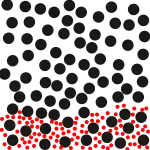OK, you've finished the whole book now. In order to supplement (add to) the exercises at the end of each chapter, there is a big quiz you have to finish before getting to the end of this book so that you know how well you did. Older kids may want to use this to prepare for tests or exams. If your computer has flash player 8 or above, you should use the interactive version at this website. Are you ready? On your marks, get set, go!
Part 1: True or false?
Each question carries one mark only.
Part 2: Multiple-choice questions
Each question carries two marks.
|
1. Which of the following is not matter? | |||||
|
| ||||
|
2. Name the process in which water changes into gas at a fixed temperature. | |||||
|
| ||||
|
3. Which of the following is incorrect according to the particle theory? | |||||
|
| ||||
|
4. Which of the following best describes the movement of pollen grains when hit by water particles? | |||||
|
| ||||
|
5. Hi! If you put me in a box whose capacity is the same as my volume, I will fit nicely inside, but you cannot squash me. I am insoluble in water, and my density is a lot less than water. What could I be? | |||||
|
| ||||
|
6. Hi! We are very good brothers. Once we come together, our total volume decreases. If some other particles come here, we welcome them happily, and let them spread evenly around us. What could we be? | |||||
|
| ||||
|
7. In which state of matter can particles slide over one another but not move freely? | |||||
|
| ||||
|
8. Which of the following statements about air particles in a hot-air balloon is not true? | |||||
|
| ||||
| 9. Given that the particles are gaseous and are enclosed in the boundaries of the diagram, what will the red particles do and why? |
| ||||
|
| ||||
|
10. Which of the following inventions is related to thermal expansion? | |||||
|
| ||||
How did you do?
If you got over 80% of the answers, congratulations! You are now familiar with the science of particles. If you got under 50%, you'd better read through the book again to ensure that your understanding of particles is good. Before you put down this book, we will look through the main points again. If you forgot about some of the things, you can always look at the summary again. This will save you a lot of time.
